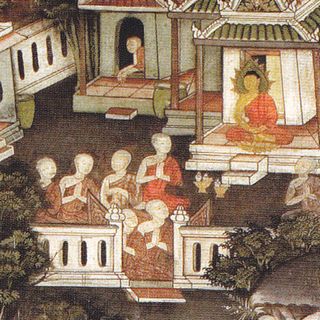
This is a text and translation of the discourse, called ‘In Brief’, [ref]AN 8.53, Saṁkhittasuttaṁ[/ref] hearing which the Buddha’s Aunt and Step-Mother Mahāpajāpatī Gotamī attained Liberation (Arahatta).
This discourse is unusual in that it simply teaches a way in which the True Dhamma can be recognised whenever it is found. Seemingly, this in itself was enough for Gotamī to realise sufficient insight to gain release.
It is part of a collection of material I am currently working on concerning the Great Bhikkhuni Disciples of the Buddha, and fills in the background to Gotamī’s story.
Ekaṁ samayaṁ Bhagavā Vesāliyaṁ viharati,
At one time the Gracious One dwelt near Vesālī,
Mahāvane Kūṭāgārasālāyaṁ.
in the Great Wood, at the Gabled Hall.
Atha kho Mahāpajāpatī Gotamī yena Bhagavā tenupasaṅkami,
Then Mahāpajāpatī Gotamī approached the Gracious One,
upasaṅkamitvā Bhagavantaṁ abhivādetvā, ekam-antaṁ aṭṭhāsi.
and after approaching and worshipping the Gracious One, she stood on one side.
Ekam-antaṁ ṭhitā kho sā Mahāpajāpatī Gotamī Bhagavantaṁ etad-avoca:
While standing on one side Mahāpajāpatī Gotamī said this to the Gracious One:
“Sādhu me, Bhante, Bhagavā saṁkhittena Dhammaṁ desetu,
“It is good for me, reverend Sir, let the Gracious One teach the Dhamma in brief,
yam-ahaṁ Bhagavato Dhammaṁ sutvā,
having heard that Dhamma from the Gracious One,
ekā vūpakaṭṭhā appamattā ātāpinī pahitattā vihareyyan-ti.
I can dwell secluded, heedful, ardent, and resolute.
“Ye kho tvaṁ, Gotami, dhamme jāneyyāsi:
“Gotamī, of those things which you can know:
‘Ime dhammā sarāgāya saṁvattanti, no virāgāya,
‘These things lead to passion, not to dispassion,
saṁyogāya saṁvattanti, no visaṁyogāya,
lead to being fettered, not to being unfettered,
ācayāya saṁvattanti, no apacayāya,
lead to increase, not to decrease, [ref]Of rebirths.[/ref]
mahicchatāya saṁvattanti, no appicchatāya,
lead to great desire, not to little desire,
asantuṭṭhiyā saṁvattanti, no santuṭṭhiyā,
lead to discontent, not to content,
saṅgaṇikāya saṁvattanti, no pavivekāya,
lead to society, not to solitude,
kosajjāya saṁvattanti, no vīriyārambhāya,
lead to indolence, not to being energetic,
dubbharatāya saṁvattanti, no subharatāyā,’ ti
lead to difficulty in support, not to ease in support,’
ekaṁsena, Gotami, dhāreyyāsi:
Gotamī, you should surely bear it in mind:
‘Neso Dhammo, neso Vinayo, netaṁ Satthusāsanan.’ ti
‘This is not Dhamma, this is not Vinaya, this is not the Teacher’s Dispensation.’
Ye ca kho tvaṁ, Gotami, dhamme jāneyyāsi:
Gotamī, of those things which you can know:
‘Ime Dhammā virāgāya saṁvattanti, no sarāgāya,
‘These things lead to dispassion, not to passion,
visaṁyogāya saṁvattanti, no saṁyogāya,
lead to not being fettered, not to being unfettered,
apacayāya saṁvattanti, no ācayāya,
lead to decrease, not to increase,
appicchatāya saṁvattanti, no mahicchatāya,
lead to little desire, not to great desire,
santuṭṭhiyā saṁvattanti, no asantuṭṭhiyā,
lead to content, not to discontent,
pavivekāya saṁvattanti, no saṅgaṇikāya,
lead to solitude, not to society,
vīriyārambhāya saṁvattanti, no kosajjāya,
lead to being energetic, not to indolence,
subharatāya saṁvattanti, no dubbharatāyā,” ti
lead to ease in support, not to difficulty in support,’
ekaṁsena, Gotami, dhāreyyāsi:
Gotamī, you should surely bear it in mind:
‘Eso Dhammo, eso Vinayo, etaṁ Satthusāsanan.’ ” ti
‘This is Dhamma, this is Vinaya, this is the Teacher’s Dispensation.’
The commentary says:
Iminā ca pana ovādena Gotamī Arahattaṁ pattā. ti
With this advice Gotamī attained Liberation.